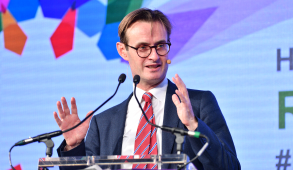NHS could have to rethink service provision
 In his finance report to the NHS England board on 6 October, Mr Kelly (pictured) listed financial pressures it faced, totalling about £14bn by 2024/25. This could rise by a further £7bn depending on levels of inflation – including the impact of pay awards and energy costs. He said the government’s measures to hold down energy costs were a massive help, but the position remained uncertain.
In his finance report to the NHS England board on 6 October, Mr Kelly (pictured) listed financial pressures it faced, totalling about £14bn by 2024/25. This could rise by a further £7bn depending on levels of inflation – including the impact of pay awards and energy costs. He said the government’s measures to hold down energy costs were a massive help, but the position remained uncertain.
He said the NHS entered the pandemic period following 10 years of funding significantly below traditional levels. ‘We had little to no resilience going into the pandemic. If you compared us at 2019/20 for nurses, doctors, acute beds per head of population to most western European countries we were right down at the low end of the league table.’
The pandemic led to a big increase in costs. ‘This year, in total funding for the NHS was planned to be reduced in real terms by about 1.4%. That includes further reductions in funding provided for Covid on the basis that we would be able to change infection control arrangements and see significantly lower Covid demand.
Efficiency ask
‘In total, the efficiency ask of systems this year was about 5%, or £5.6bn in cash terms. That’s very stretching and some of the assumptions we were asked to make when we did the planning have not come through.
‘We have seen higher numbers of Covid patients in hospital over the course of this last six months than in any equivalent point during the pandemic. We have also seen a decline in the domiciliary care workforce over the last 12 months making it harder to discharge patients back to their homes. That has driven much higher bed occupancy – we currently have over 7,000 patients in hospital for longer than seven days than we had pre pandemic.’
In addition to the stretching targets, the NHS has absorbed higher inflation costs. ‘We have put an extra £1.5bn in, and had to find about another £1.5bn to deal with a contribution to the pay settlement, a contribution to the broader testing costs and other responsibilities transferred to us that we’ve had to absorb without funding.’
The NHS had committed to deliver significant efficiencies in the spending review settlement last year. As well as the £5.6bn he had outlined, Mr Kelly said there was a further £3.6bn next year and £2.8bn in 2024/25. In total, the NHS has committed to delivering around £12bn of efficiencies, including reducing Covid costs from around £5bn to about £0.5bn, over three years.
‘If you take the extra cost pressures we have had to absorb this year, which are likely to become recurrent, we could be seeing cost pressures of around £14bn by 2024/25, which is 10% of our nominal cost base,’ he told the board.
NHS England has been developing plans to deliver this while maintaining commitments on elective waits, cancer, emergency pressures and access to primary care, as well as investment in mental health, for example.
‘Ongoing inflation pressures are clearly the confounding factor right now. There are massive uncertainties about what this will be, but if you were to take the Bank of England’s last forecast, we’re looking at 9% CPI next year. Even if that fell down to about 2% the year after that, that level of inflation and a pay settlement for NHS staff next year similar to that we have seen this year, could see further cost pressures of £6bn to £7bn, in addition to the £14bn we think we might have to be consuming.
‘At that point you’re clearly not talking about further efficiencies. We will be having to consider talking through with the government what the options would be to manage that pressure and if we have to manage it within the nominal budget that we have. Clearly you’d have to revisit investment in cancer, mental health, primary care and increasing diagnostic capacity. You would have to look at what it meant in terms of what the NHS could deliver.’
Earlier this week, the chancellor said the government would stick to the spending review commitments outlined last year, making it likely there will be no further funding allocated to the NHS.

NHS Providers’ director of policy and strategy Miriam Deakin said: ‘Warnings from national NHS leaders that investment in key services such as cancer, mental health and primary care may have to be completely revisited because of pressures on health budgets will be met with deep concern by trust leaders and patients alike.
‘The stretching efficiency targets placed on trusts this year were based on a set of assumptions that have been overtaken by events. Trusts are facing additional cost pressures caused by workforce shortages, increased activity to tackle backlogs, and a cut in funding to deal with the continuing impact of Covid-19.
‘Then there’s the government’s failure to fully fund the staff pay award – another financial hit. Inflation is eating into NHS budgets, making it even harder to meet ever-growing demand.’
She added: ‘Everyone in the NHS is dedicated to delivering high-quality care, but this will be increasingly difficult to deliver as trust leaders grapple with budget constraints, staggering levels of staff vacancies and what is expected to be an incredibly difficult winter ahead with a potential “twindemic” of Covid-19 and flu on the horizon.’
Mr Kelly also gave the board an update on the current financial position. At the end of month four, in aggregate the NHS was around £200m off plan, largely due to a deterioration in the provider position.
However, finances were tight, particularly with the current spike in hospitalisations due to Covid, and higher than planned staff sickness absences leading to higher temporary staffing costs. Providers faced high emergency demand, but elective costs were also higher due to the increased cost of sessions outside normal working hours, which have been implemented to maintain activity. Elective activity is higher this year than in 2021/22.
In total, commissioners were on plan. Overall, the NHS is forecasting delivery on plan at the end of the financial year, but clearly there were risks. The additional £500m to support safe discharge of patients from hospital was welcome, he added.
Related content
The value masterclass shares examples of organisations and systems that have pursued a value-driven approach and the results they have achieved.
This webinar series offers colleagues of ICS organisations the opportunity to discuss common priorities, challenges, and successes within their field.